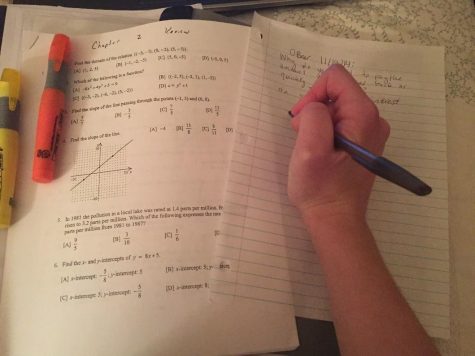Exams are here: pre-exam stress and how to study
January 9, 2015

Whether you are an old pro at taking exams or a freshman not sure what to expect, everyone could use some advice and reassurance on the stress and trials that inevitably come with exams.
Some are last minute crammers; some are conscientious early planners and studiers, while others just “wing it.” Most are probably between such extremes.
There are numerous ways to go about studying for exams.
“It really depends on what the teacher’s do; if they give tests back I look those over, otherwise I look over my notes,” junior Calista Robbins said.
Some teachers give out study guides, reviews, or exam packets. These are always extremely helpful, as then students can confidently study the material they will be expected to know.
Also, teachers usually make such packets mandatory assignments, further helping students who procrastinate, write such things off, or would otherwise casually look over the material and assure themselves that they are “good.”
“I look papers over, but I don’t really study. It depends on how I feel about the subject,” junior Sarah Wessinger said.
While even just thinking about the idea of exams may send many into a plethora of worry, anxiety, and a sense of helplessness, if taken step by step and lesson by lesson, one’s stress can be lessened. Also, there are numerous ways to study. There are the packets, quizzes, tests, worksheets, and flashcards to look into.
Try to study with and without music and see which works best, however it should be instrumental music without words, because however much one may claim to be good at multitasking, such music can only hurt one’s studying routine.
“I usually study the week of exams so that the material is fresh in my mind,” said Robbins.
It is important to plan ahead, yes, but reviewing closer to the date of the exam is always a good refresher. However, it is best if it is a refresher, and not the first time you are seeing the information.
“I study with friends sometimes and I study alone, but not very often. I usually study the week of the exams, but maybe a bit the week before,” said Wessinger.
Different subjects should be approached differently. English is usually skills and comprehension based, having questions based off of reading material, concepts, and past knowledge.
“My hardest exam will probably be chemistry and my easiest would be English or psychology,” said Robbins.
Meanwhile, math lessons should be approached not with learning how to analyze the material in the abstract, but to study and carefully and correctly apply the material to the given problems.
“My hardest exams are between math and English. I think my easiest would be American Sign Language, because I’ve done them before, so I know what they will look like and how to study for them,” said Wessinger.
If after all the studying and planning, students still feel the all too familiar exam anxiety, here is something to look forward to: at the end of exam week is a four day weekend.






